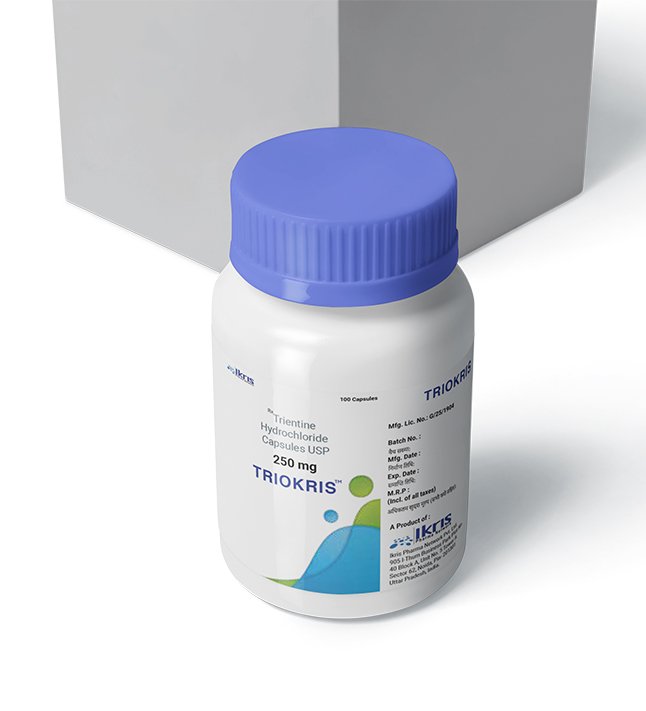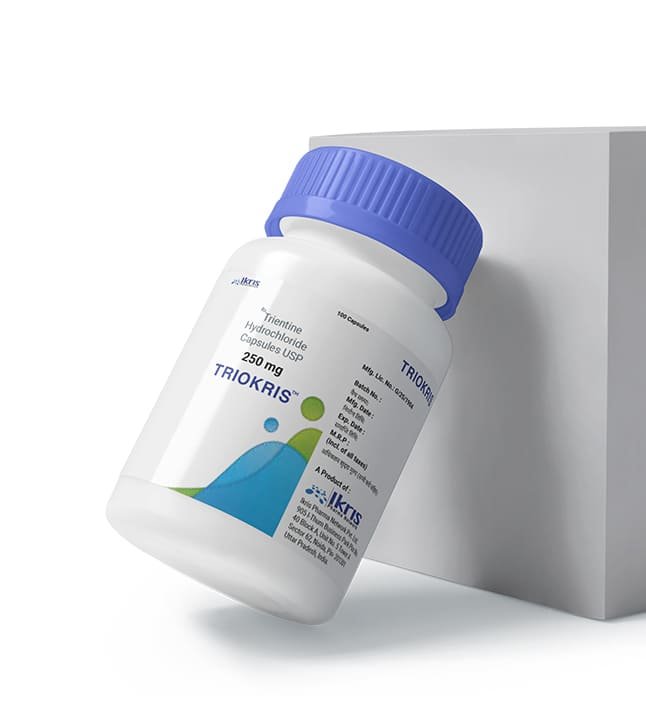Triokris™ (Trientine Hydrochloride Capsules USP 250 mg)
Trusted Therapy for Wilson’s Disease Management
Triokris™ is a copper-chelating agent indicated for the treatment of Wilson’s Disease, especially in patients who cannot tolerate D-Penicillamine. Manufactured in a USFDA-approved facility and distributed by Ikris Pharma Network, Triokris™ ensures global-standard safety, efficacy, and compliance.
As a trusted Trientine supplier in India, Ikris Pharma Network offers reliable access to Trientine 250 mg, supporting patients and healthcare providers worldwide. Triokris™ is recommended globally for patients seeking a safer alternative for long-term copper management.
About Wilson’s Disease:
Wilson’s disease is a rare genetic disorder of copper metabolism that leads to toxic accumulation of copper in the liver, brain, and other vital organs. Early diagnosis and lifelong treatment are essential to prevent severe complications. Trientine Hydrochloride (Triokris™) is a key therapy recommended when D-Penicillamine is not tolerated, offering patients a reliable and safer alternative. As one of the leading options for the treatment of Wilson’s disease, Triokris™ is widely used in India and globally.
To support global patients, Ikris Pharma Network facilitates Trientine in India, helping international patients buy Trientine online from India through compliant sourcing pathways.

Clinical Benefits of Triokris™ :-

Effective in hepatic & neurological manifestations of Wilson’s Disease.
Lower risk of hypersensitivity compared to D-Penicillamine.
Improves long-term clinical outcomes with continuous therapy.
Well tolerated by patients requiring lifelong copper management.
Triokris™ is recognized as an affordable therapeutic option for those seeking Trientine from India, ensuring consistent therapeutic response and long-term disease control.
Dosage & Administration:-

Adults & Adolescents: Usual dose ranges between 750–1500 mg/day, divided into 2–4 doses.
Must be taken on an empty stomach (at least 1 hour before or 2 hours after meals).
Should not be taken with iron, zinc, calcium, or magnesium supplements at the same time, as they interfere with absorption.
Dosage must be individualized and supervised by a physician based on patient needs and monitoring results.
For patients and caregivers searching for Trientine 250 mg guidelines, Triokris™ provides a clinically validated approach to copper chelation.
Safety & Precautions:-

Not interchangeable with D-Penicillamine.
Contraindicated in patients with known hypersensitivity to Trientine.
Regular monitoring required: liver function tests, blood counts, serum copper, and ceruloplasmin levels.
Caution advised: may cause anemia due to iron depletion—patients should be monitored closely.
Triokris™ follows strict global safety standards, making it one of the most trusted options for patients looking for a reliable Trientine manufacturer in India.
Product Information:-

Active Ingredient: Trientine Hydrochloride USP
Strength: 250 mg capsules
Presentation: 100 capsules per bottle
Storage: Store at 25°C, protected from moisture and light.
Manufacturing: Produced in a USFDA-approved facility, ensuring global safety and quality standards.
Triokris™ remains a preferred formulation for healthcare institutions, comparing Trientine price in India and evaluating quality-driven therapeutic outcomes.
Why Choose Triokris™ from Ikris Pharma Network?:-

Manufactured in a USFDA-approved, GMP-compliant facility.
Distributed via EU-GDP, WHO-GDP & ISO-certified pharmaceutical logistics.
Widely accessible across India, Africa, Asia, the Middle East, LATAM, and CIS regions.
Trusted partner for compliant global distribution and specialty medicine supply.
With its robust infrastructure, Ikris Pharma Network supports the export of Trientine to multiple regions, meeting the growing demand for high-quality therapy across global markets.
Frequently Asked Questions (FAQs):

What is Triokris (Trientine Hydrochloride Capsules) used for?
Triokris™ (Trientine Hydrochloride Capsules USP 250 mg) is used in the treatment of Wilson’s Disease, a rare disorder where excess copper builds up in the body. It is especially recommended for patients who cannot tolerate D-Penicillamine.

How does Trientine work in Wilson’s Disease?
Trientine acts as a chelating agent, meaning it binds to excess copper in the body and helps remove it through urine. This reduces copper accumulation in the liver, brain, and other organs, preventing long-term damage.

Is Triokris available in India?
Yes. Triokris™ is available in India through Ikris Pharma Network, manufactured in a USFDA-approved facility, and supplied via WHO-GDP & ISO-certified logistics. International buyers can request Trientine in India for legitimate access pathways.

What is the usual dosage of Trientine?
For adults and adolescents, the typical dose ranges from 750–1500 mg/day, divided into 2–4 doses. It must be taken on an empty stomach and only under a physician's supervision.

What precautions should patients take while using Trientine?
Not interchangeable with D-Penicillamine.
Avoid taking at the same time as iron, zinc, calcium, or magnesium supplements.
Regular monitoring of liver function, blood counts, and copper levels is essential.

Can Triokris be exported to other countries?
Yes. Through Ikris Pharma Network’s global distribution channels, Triokris™ can be exported to Africa, Asia, the Middle East, Europe, and Latin America under compliant supply programs. The company supports healthcare institutions, distributors, and regulated importers requiring Trientine from India.

Is Trientine available in Latin American countries?
Yes. Ikris Pharma Network supports access to Trientine (Triokris™) across multiple Latin American (LATAM) countries through fully compliant global export channels. This includes Brazil, Mexico, Colombia, Chile, Argentina, Peru, Ecuador, Costa Rica, Uruguay, Paraguay, Panama, Guatemala, Honduras, Dominican Republic, El Salvador, Bolivia, and Nicaragua. Availability may vary locally, but Ikris Pharma Network ensures regulated, secure, and documentation-ready shipments from India to most LATAM regions.

Does Ikris Pharma Network ship Trientine to Mexico and Central America?
Yes. Trientine is supplied to Mexico and Central American countries such as Guatemala, Panama, Honduras, El Salvador, and Nicaragua through regulated export programs. All orders follow global GDP protocols and country-specific import requirements.

Is Trientine available in Gulf countries (GCC)?
Yes. Ikris Pharma Network supplies Trientine (Triokris™) to multiple Gulf Cooperation Council (GCC) countries through fully compliant international export channels. This includes the United Arab Emirates (UAE), Saudi Arabia, Qatar, Kuwait, Bahrain, and Oman. Availability may differ locally, but Ikris Pharma Network ensures secure, GDP-compliant, and fully documented shipments from India to all major GCC destinations.

Does Ikris Pharma Network offer Trientine supply across the Middle East?
Yes. Beyond GCC, Ikris Pharma Network supports Trientine access in broader Middle Eastern regions including Jordan, Lebanon, Iraq, and Yemen. All shipments follow WHO-GDP guidelines and meet country-specific regulatory requirements.
References:

Ferenci P, Członkowska A. Trientine for Wilson’s Disease: A review of clinical outcomes. Clin Liver Dis (Hoboken). 2023.
Weiss KH, Stremmel W. Clinical management of Wilson’s Disease with chelating agents: Focus on Trientine.World J Gastroenterol. 2022.
Roberts EA, Schilsky ML. Diagnosis and treatment of Wilson disease: An update. Hepatology. 2008.
American Association for the Study of Liver Diseases (AASLD). Wilson Disease Clinical Practice Guidelines.2022.
Członkowska A, Litwin T, Dusek P, et al. Wilson disease – A comprehensive review of pathophysiology, clinical presentation, and management. Orphanet J Rare Dis. 2018.
Mayo Clinic. Wilson’s Disease – Symptoms and causes. 2023.







